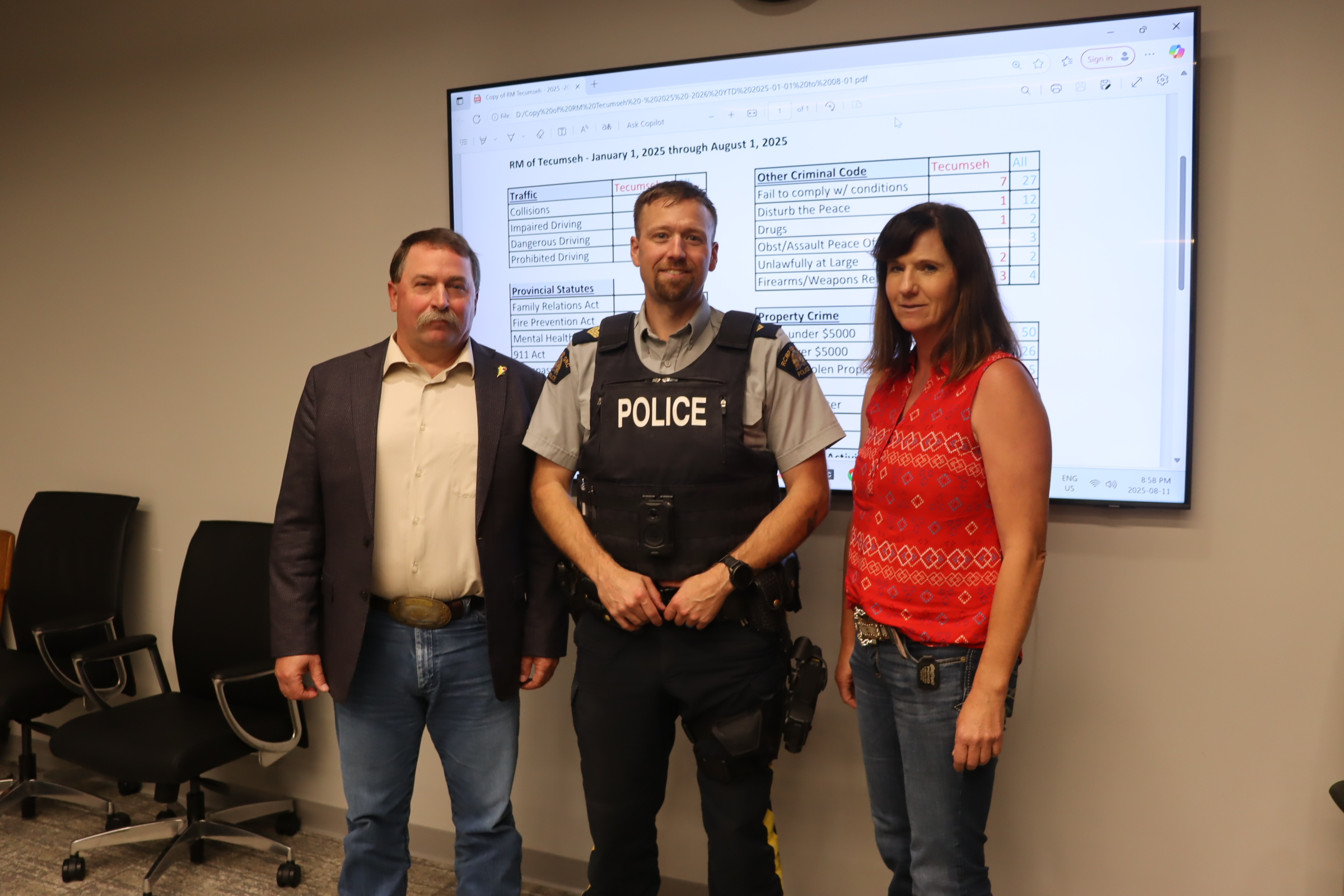A recent community meeting hosted by the RM of Tecumseh brought together residents, law enforcement, and political leaders to confront the growing issue of rural crime. The event featured a candid and informative presentation by RCMP Sgt. Warner Ignatiuk, alongside remarks from MLA Hon. Daryl Harrison, who addressed provincial efforts to support justice reform and community safety.
Sgt. Ignatiuk opened the meeting with a clear message: rural communities are not alone in their frustrations.
“I’m not going to sugarcoat things,” he said. “I understand the frustrations you face. I was born and raised in rural Saskatchewan, I get it.”
He outlined staffing levels across the Weyburn, Radville, and Fillmore detachments, noting that while the RCMP is currently well-staffed, turnover and parental leaves have created short-term challenges.“I work with the finest group of humans and police officers I’ve met in 18 years. You have the best detachment in southeast Saskatchewan.”
Ignatiuk presented year-to-date crime statistics, but emphasized that numbers only tell part of the story. “These stats reflect reported incidents, but not the proactive work we do, patrols, check stops, mental health support, and hundreds of daily contacts.”
He urged residents to report suspicious activity, even if it seems minor. “Suspicious persons and vehicles are often the key to solving bigger crimes. Your call might be the missing piece.”
Sgt. Ignatiuk broke down Section 35 and 494 of the Criminal Code, explaining when and how property owners can defend themselves or make a citizen’s arrest.
“You have the right to protect yourself and your property, but only with reasonable force. Lethal force is only justified when there’s a real threat to life and no other option.”
He cautioned against taking justice into one’s own hands and clarified that video surveillance is admissible in court, even without signage. “Your camera, your property. Just make sure the majority of the frame is your land.”
Ignatiuk offered practical strategies for deterring crime:
- Trail cameras with cellular connectivity: Affordable and effective.
- Motion sensor lights and alarms: Simple tools that increase visibility.
- Regular checks on unoccupied properties: Show signs of activity to deter thieves.
- Mark and document valuables: Serial numbers and photos help police recover stolen items.
“If we recover stolen property, unique markings help us return it to the rightful owner.”
Residents shared emotional stories of theft, vandalism, and feeling unsafe. “I had a robber come into my yard four times,” one woman said. “I reported it. Nothing happened.”
Another added: “We know who’s causing the trouble. They’re still walking around. It’s the same people every time.”
Sgt. Ignatiuk acknowledged these concerns, “Mistakes happen. The police always have room for improvement. But we need your help, reporting gives us leads and builds cases.”
MLA Daryl Harrison addressed the limitations of provincial authority over the Criminal Code of Canada, but affirmed that Saskatchewan is advocating for change. “Minister Tim McLeod and other attorneys general are pushing for stiffer sentences. But it’s a federal issue, we need Ottawa to act.”
He also supported citizens on patrol and community-driven crime watch programs, calling them “essential tools” in rural safety. “Making criminals uncomfortable is key. If they know they’re being watched, not just by police, but by neighbors, they’ll think twice.”
One of the most powerful moments came when a resident asked:
“Why are we always talking about criminals? What about the victims?”
Others echoed the sentiment, pointing out the emotional toll of theft and the lack of restitution. “It’s not just about the money. It’s about feeling safe. Feeling respected.”
Sgt. Ignatiuk responded: “You’re right. We need to do better, for the victims, for the families, and for the communities.”
Several residents expressed frustration with the legal system, citing cases that dragged on for years or were dismissed entirely.
Sgt. Ignatiuk shared his own experience, “Ten years ago, things started to change. It’s not that the law itself changed, but how it’s being applied.”
The meeting closed with a clear message: community involvement is essential.
“You’re not bothering us. You’re helping us. The more you report, the more we can do,” said Sgt. Ignatiuk.
MLA Harrison echoed the sentiment, “Let’s work together. Let’s build safer communities, not just with laws, but with trust and collaboration.”
The RM of Tecumseh’s rural crime meeting was more than a forum, it was a powerful reminder of the strength and resilience of rural Saskatchewan. With heartfelt stories, honest dialogue, and practical advice, residents, law enforcement, and political leaders came together to confront the realities of crime, the frustrations of a slow justice system, and the urgent need for reform.
Sgt. Warner Ignatiuk’s message was clear: safety starts with awareness, prevention, and community vigilance. MLA Daryl Harrison echoed the call for collaboration, acknowledging the challenges while committing to continued advocacy. As voices rose in unity, one truth stood out, rural residents are ready to protect what matters most, and they’re not facing it alone.
